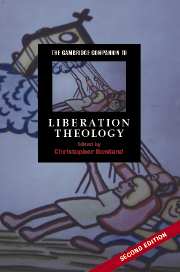Epilogue: the future of liberation theology
Published online by Cambridge University Press: 28 January 2008
Summary
Readers of this book may wonder whether its subject-matter is merely a phase of modern political theology at a time when a critical Marxism, unfettered by the rigidities of its Eastern European manifestations, pervaded the social teaching of late twentieth-century Roman Catholicism, only to be snuffed out by a determined reaction from a more traditionalist papacy. That would be a superficial assessment. We are dealing with a movement whose high point as the topic of discussion on the agenda at every theological conference may now have passed, but whose influence, in a multitude of ways, direct and indirect, is as strong as ever. The issues which concern liberation theologians today are more inclusive and extend to questions of race, gender, popular religion, and, more recently, the environment, and have taken root in other situations and religions apart from Christianity. So when the leaders of Roman Catholicism can proclaim that liberation theology is dead, sentiments echoed by some who hitherto have been exponents of liberation theology, they miss the enormous impact that this way of setting about the theological task continues to have in many parts of the world, not least in the citadels of Catholicism itself: 'the fundamental tenets of liberation theology had - almost surreptitiously - been broadly accepted in many parts of the Catholic church'. So, having flourished in the Third World many of the fundamental tenets of liberation theology are firmly established in the First World, sometimes in institutions of higher education, more often in the life of the Church at the grassroots, in popular education and among groups working for justice and peace. In thinking of it as a mere epiphenomenon of the radical social movements of the sixties and seventies, we miss the extent of its impact.
- Type
- Chapter
- Information
- The Cambridge Companion to Liberation Theology , pp. 304 - 307Publisher: Cambridge University PressPrint publication year: 2007

